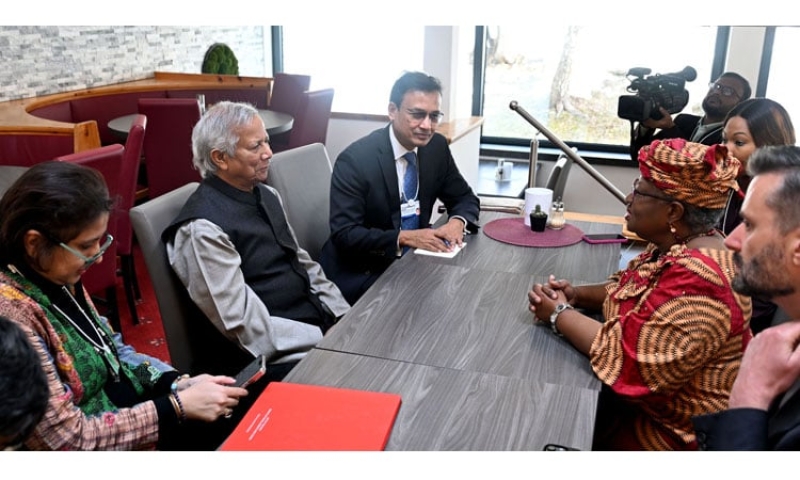- Trump considering military options on Greenland; Europe rejects |
- Fertiliser crunch threatens Kushtia’s onion boom despite high prices |
- Security Council Divided on United States' Venezuela Action |
- Over 1.53m voters register for postal balloting: Shafiqul Alam |
WTO to Support BD’s Transition from LDC, Its Chief Tells CA

Chief Adviser Professor Muhammad Yunus met with the Director General of the World Trade Organization (WTO) Ngozi Okanjo Iwala in Davos on Friday. Photo: PID
World Trade Organization (WTO) Director General Dr. Ngozi Okonjo-Iweala assured Bangladesh of the global trade body’s full support in facilitating the country’s smooth transition out of the Least Developed Country (LDC) status and helping attract global businesses to shift their supply chains to the South Asian nation.
Dr. Okonjo-Iweala made these remarks during a meeting with Chief Adviser Professor Muhammad Yunus on the sidelines of the World Economic Forum’s annual meeting in Davos, Switzerland, as reported by Deputy Press Secretary Abul Kalam Azad Majumder.
As Bangladesh approaches its graduation from the LDC category, Dr. Okonjo-Iweala emphasized the WTO’s commitment to ensuring a seamless transition. "We have established principles, and we will work alongside you," she assured.
In addition to supporting Bangladesh’s development, Dr. Okonjo-Iweala revealed that she was engaging with leading global companies, advocating for them to relocate their supply chains to Bangladesh. "Why not Bangladesh?" she said, highlighting the country’s potential as part of the broader global shift toward decentralized supply chains. "We are intensifying efforts to bring more supply chains here."
In response, Chief Adviser Professor Yunus praised Dr. Okonjo-Iweala's leadership in invigorating global trade negotiations and highlighted Bangladesh's readiness for growth. He noted that after overcoming past economic challenges tied to oligarchic control, the country was now a welcoming environment for business. "Bangladesh is poised to become one of the largest manufacturing hubs, thanks to our young, tech-savvy, and skilled workforce," Yunus said.
He also pointed to ongoing reforms under the Interim Government, including efforts to reduce congestion at Chittagong Port, as part of a broader strategy to attract foreign investment. "We are committed to fighting corruption, particularly targeting those involved in illicit international deals tied to the former regime," he added.
Dr. Okonjo-Iweala praised the resilience and activism of Bangladesh's youth, particularly highlighting the July mass protests. "Their energy has set an inspiring example and delivered a powerful message," she said. She also commended Professor Yunus for his leadership in restoring stability and positioning Bangladesh back on the global stage. "You are a symbol of stability, and with that stability, Bangladesh has regained its place on the world map," she remarked.
During the discussions, Dr. Okonjo-Iweala urged Bangladesh to ratify the WTO’s fisheries subsidy agreement, with the Chief Adviser confirming that the government would review the proposal. Bangladesh’s Permanent Representative to the UN in Geneva, Tareq Ariful Islam, assured that the country was actively engaged in negotiations on the agreement.
Dr. Okonjo-Iweala also encouraged Bangladesh to support other key instruments under negotiation at the WTO, including the Investment Facilitation for Development Agreement. Lamiya Morshed, the SDG coordinator for Bangladesh, was also present at the meeting.
This dialogue underscores the growing international confidence in Bangladesh’s economic future, with the WTO offering tangible support as the country transitions into a new phase of growth and development.

